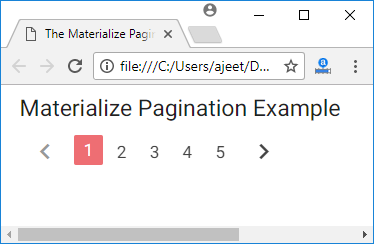Pagination is used to split out your long pages into shorter, easier to understand blocks. It is used to link the small pages on a single home page.
The pagination class is used to add pagination in Materialize CSS.
pagination: It is used to set the ul element as a pagination component.
Example
<html>
<head>
<title>The Materialize Pagination Example</title>
<meta name = "viewport" content = "width = device-width, initial-scale = 1">
<link rel = "stylesheet"
href = "https://fonts.googleapis.com/icon?family=Material+Icons">
<link rel = "stylesheet"
href = "https://cdnjs.cloudflare.com/ajax/libs/materialize/0.97.3/css/materialize.min.css">
<script type = "text/javascript"
src = "https://code.jquery.com/jquery-2.1.1.min.js"></script>
<script src = "https://cdnjs.cloudflare.com/ajax/libs/materialize/0.97.3/js/materialize.min.js">
</script>
</head>
<body class = "container">
<div class = "row" style = "width:560px;">
<div class = "col s12 m12 l12" >
<h5>Materialize Pagination Example</h5>
<ul class = "pagination">
<li class = "disabled"><a href = "#!">
<i class = "material-icons">chevron_left</i></a></li>
<li class = "active"><a href = "#!">1</a></li>
<li class = "waves-effect"><a href = "#!">2</a></li>
<li class = "waves-effect"><a href = "#!">3</a></li>
<li class = "waves-effect"><a href = "#!">4</a></li>
<li class = "waves-effect"><a href = "#!">5</a></li>
<li class = "waves-effect"><a href = "#!">
<i class = "material-icons">chevron_right</i></a></li>
</ul>
</div>
</div>
</body>
</html>Output:

Leave a Reply